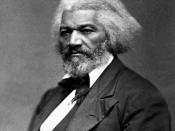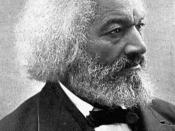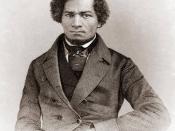On an unknown date in 1817, on a slave plantation in Tuckahoe Maryland,
Frederick August Washington Bailey was born. Frederick was raised in a house
on the plantation with all the other slave children. At the age of seven,
like many other slaves, Frederick was put to work in the fields. As a young
child he would wonder why he was a slave, and why everyone can't be equal.
His thoughts frequently came back to him, leaving him with a great hatred for
slavery. In 1836, Frederick had finally had enough of his imprisonment, and
attempted an escape with many other slaves. The escape was not successful,
Frederick and the other slaves were sent to work in a shipyard hauling crates.
Frederick worked the shipyard for two years until he had another great escape
idea, this one would work though. The sailing papers of a sailor had been
borrowed, and disguised as a sailor, Frederick Douglass made his escape to New
Bedford, Massachusetts.
Upon his arrival, Frederick took up his new assumed
last name Douglass, to escape being captured. In 1841, Frederick attended an
anti-slavery convention in Nantucket Massachusetts. Here, his impromptu
speech he gave showed him to be a great speaker. The opponents of Frederick
believed that he was never a slave, because of his great speaking skills
and knowledge. In response to this, Frederick wrote his life story in his
book _Life and Times of Frederick Douglass_. Frederick made a fatal mistake
though, he had used the name of his old master on the slave plantation. Upon
learning of this, his old master sent slave catchers to New England to bring
him back. Fearing a life of slavery again, Frederick fled to England. Here
in England, he gave many lectures on the abolitionists movement, and earned
sufficient funds to buy his freedom in America. In 1847, Frederick became the
'station master' of the Underground Railroad in Rochester, New York. Here
he also began publishing his anti-slavery newspaper, The North Star. During
these publishing years, Frederick became good friends with John Brown. John
had a vision of training groups of men to help slaves escape via the
Underground Railroad. However, in 1859, Douglass learned it was Brown's
intention to raid the Federal arsenal at Harpers Ferry. He was sure this
would bring disastrous results, and took no part in the raid. Following the
raid, Douglass fled to Europe, fearing the government would hold him
responsible for what had happened. He stayed for six months, until finally
returning to America to campaign for Abraham Lincoln during the Presidential
election of 1860. At the outbreak of the Civil War, Frederick helped raise
the regiment of the Massachusetts 54th. This group of soldiers fought hard,
and Douglass was respected as a leader of ex-slaves. Frederick soon fought
for the 13th, 14th, and 15th Amendments for the U.S. Constitution, which gave
rights to everyone. He became U.S marshal for the District of Columbia
(1877-81), recorder of deeds for the District of Columbia (1881-86) and U.S.
minister to the Republic of Haiti (1889-91). After his death in 1895, people
mourned the loss of one of the great freedom fighters of the 1800's.


